
Battle Royale II: Requiem is a 2003 Japanese dystopian action film directed by Kinji Fukasaku and Kenta Fukasaku, who co-wrote the screenplay with Norio Kida. It is the sequel to the 2000 film Battle Royale, which in turn was based on the 1999 novel of the same name by Koushun Takami. Unlike the first film, Requiem is an original story. It is set three years after the events of the previous film and follows Shuya Nanahara, who has now become an international terrorist intending to bring down the Japanese totalitarian government. As a result, another class of ninth graders is kidnapped and sent to eliminate Nanahara within a limited time period of 72 hours.

Dead or Alive, abbreviated as DOA, is a 1999 Japanese yakuza action film directed by Takashi Miike. It stars Riki Takeuchi as the gang boss and former yakuza Ryūichi and Show Aikawa as the Japanese cop Detective Jojima and focuses on their meeting and conflict. It is the first in a loosely-connected three-part series, followed by Dead or Alive 2: Birds in 2000 and Dead or Alive: Final in 2002.

Yakuza film is a popular film genre in Japanese cinema which focuses on the lives and dealings of yakuza, Japanese organized crime syndicates. In the silent film era, depictions of bakuto as sympathetic Robin Hood-like characters were common.

Zebraman is a 2004 Japanese tokusatsu action comedy superhero film directed by Takashi Miike, written by Kankurō Kudō and stars Shō Aikawa as the main character, a superhero named "Zebraman".

Riki Takeuchi is a Japanese actor best known for his roles in v-cinema yakuza movies.
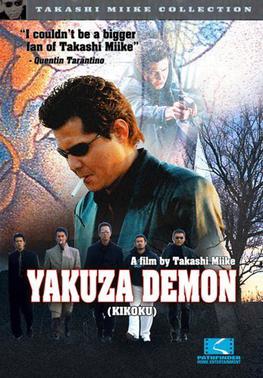
Kikoku is a Japanese yakuza film directed by Takashi Miike. The film reunites Miike with Riki Takeuchi, who stars as the main character.

Fudoh: The New Generation is a 1996 Japanese film directed by Takashi Miike, based on an unfinished manga series by Hitoshi Tanimura. Two sequels followed, neither of which were directed by Miike.

Dead or Alive 2: Birds is a 2000 Japanese film directed by Takashi Miike. Dead or Alive 2: Birds is unrelated to Dead or Alive (1999) or Dead or Alive: Final (2002) except that all three films have Show Aikawa and Riki Takeuchi in them, and they are all directed by Takashi Miike.

Ley Lines is a 1999 Japanese film directed by Takashi Miike, and is the third film in his Black Society trilogy, following 1995's Shinjuku Triad Society and 1997's Rainy Dog. Like many of Miike's works, the film examines the underbelly of respectable Japanese society and the problems of assimilation faced by non-ethnically Japanese people in Japan. The English title refers to ley lines, the paranormal concept of geographic lines of energy based on the placement of landmarks.
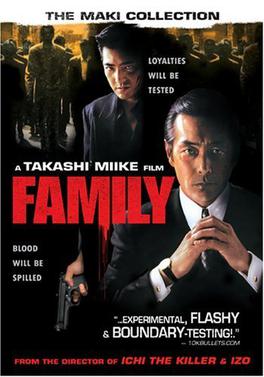
Family is a 2001 Japanese yakuza film directed by Takashi Miike. This film together with its sequel Family 2 comprise the complete Family saga.

Shangri-La is a 2002 Japanese comedy film directed by Takashi Miike. It is based on the autobiographical novel Tōgenkyō no hito-bito by Yūji Aoki.
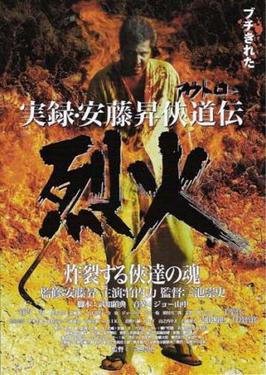
Deadly Outlaw: Rekka, also known as Violent Fire, is a 2002 Japanese yakuza film directed by Takashi Miike starring Riki Takeuchi and Sonny Chiba. Known in Japan as Jitsuroku: Andō Noboru Kyōdō-den - Rekka, it is loosely based on actor Noboru Ando's former life as a yakuza.
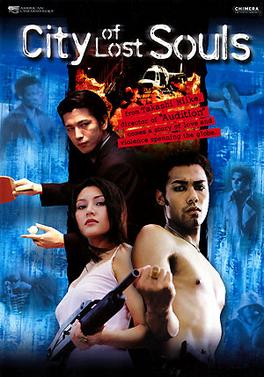
The City of Lost Souls is a 2000 Japanese action film directed by Takashi Miike based on a novel by Hase Seishu.

Daiei Film Co. Ltd. was a Japanese film studio. Founded in 1942 as Dai Nippon Film Co., Ltd., it was one of the major studios during the postwar Golden Age of Japanese cinema, producing not only artistic masterpieces, such as Akira Kurosawa's Rashomon (1950) and Kenji Mizoguchi's Ugetsu (1953), but also launching several film series, such as Gamera, Zatoichi and Yokai Monsters, and making the three Daimajin films (1966). It declared bankruptcy in 1971 and was acquired by Kadokawa Pictures.

Lady Hunter: Prelude To Murder is a 1991 Japanese action film directed by Takashi Miike. It was the first film shot by Takashi Miike, even though it was released after Toppū! Minipato tai - Aikyacchi Jankushon.
The 9th Japan Film Professional Awards (第9回日本映画プロフェッショナル大賞) is the 9th edition of the Japan Film Professional Awards. It awarded the best of 1999 in film. The ceremony took place on April 8, 2000 at Theatre Shinjuku in Tokyo.

Bodyguard Kiba: Apocalypse of Carnage, also known as Bodyguard Kiba 2: Combat Apocalypse or simply Bodyguard Kiba 2, is a 1994 Japanese direct-to-video martial arts/action film directed by Takashi Miike. It is the sequel to the 1993 film Bodyguard Kiba and is followed by Bodyguard Kiba: Apocalypse of Carnage 2 (1995), the final part of the trilogy.
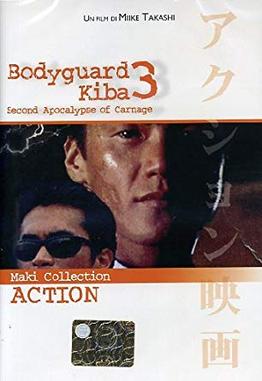
Bodyguard Kiba: Apocalypse of Carnage 2, also known as Bodyguard Kiba 3: Second Apocalypse of Carnage, Bodyguard Kiba: Combat Apocalypse 2, or simply Bodyguard Kiba 3, is a 1995 Japanese direct-to-video martial arts/action film directed by Takashi Miike. It is the final part of Miike's Bodyguard Kiba trilogy, following the 1993 film Bodyguard Kiba and the 1994 film Bodyguard Kiba: Apocalypse of Carnage.
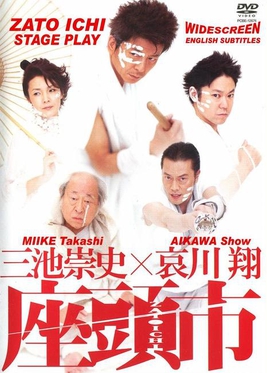
Miike Takashi × Aikawa Show: Zatoichi, also known as Zatoichi Live, is a filmed stage production of Zatoichi, a play co-written by Takashi Miike and Masa Nakamura based on the character created by Kan Shimozawa. It was Miike's second filmed stage production, following Demon Pond in 2005. The stage production was performed and filmed on December 12, 2007, and the DVD was released on May 30, 2008.

Demon Pond is a filmed stage production of Demon Pond, a play by Keishi Nagatsuka based on the 1913 play by Izumi Kyōka. The production, directed by Takashi Miike, was filmed before a live audience and released on DVD in Japan on May 25, 2005.



















